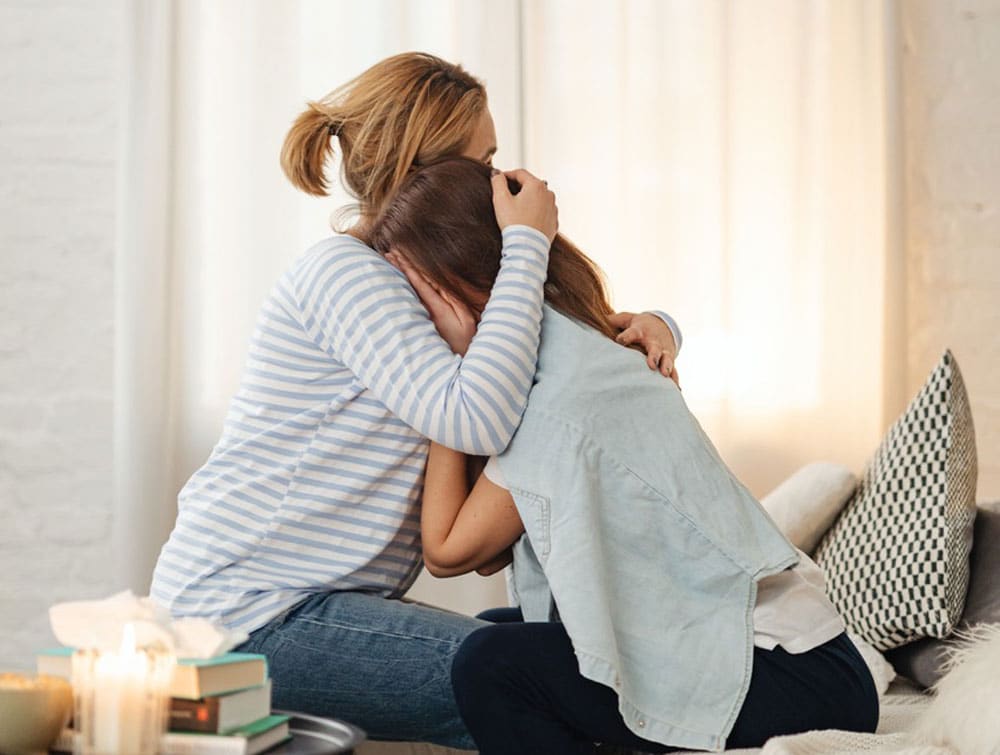One thing we know as Funeral Directors; is how much love, time and energy people put towards planning a funeral or memorial for their person. It is a labour of love, usually performed within a tight time frame and with a foggy mind.
The day of the funeral service is met with a combination of relief that it all came together, a deep appreciation to have the chance to say goodbye and gratitude for the community around you.
But the day after the funeral, then what?! There is nowhere to go, no urgent tasks in front of you, the fatigue often sets in and having to sit with what has happened can be uncomfortable. For many people, the question of ‘how do you even begin to process what has happened in the past couple of weeks’ can be difficult to sit with.
We know how hard those initial days, weeks and months can be for those closest to the deceased.
Picaluna is proud to be a charity partner with Griefline, an amazing free online resource that anyone who has experienced loss has access to.
But for those who have experienced death by suicide the need for specific support that addresses the complexity for those left behind is acute and fortunately, there are so many incredible services available.
A sobering statistic, that can be hard to accept, identified on the Hope Bereavement Care website is that suicide is now the leading cause of death for both males and females aged between 15-44 years of age.
Below is a list of incredible organisations and resources that provide either suicide prevention or postvention support for those impacted by death by suicide.
Suicide support services:
Roses In The Ocean is an organisation founded by a sister who lost her brother to suicide and is focused on lived experiences of suicide. Roses In The Ocean defines ‘lived experience of suicide as having experienced suicidal thoughts, survived a suicide attempt, supported a loved one through suicidal crisis, or been bereaved by suicide.’
Their website shares so many firsthand experiences of suicide and resources on:
People experiencing suicidal thoughts
Caring for someone in a suicidal crisis
How to use your personal experience to assist others
Understanding and integrating lived experience better
Suicide prevention for seniors
Men sharing their stories of suicidal thoughts
Regional and remote experiences
A long with articles and interviews on pretty much any other stigma or taboo around suicide you can think of.
Rose In The Ocean focuses on encouraging those who are affected by death by suicide to spend time with, and communicate with, others who are also bereaved by suicide or having experienced suicidal thoughts first-hand.
They aim to create safe, supportive spaces that make people feel understood and show them they are not alone in this experience. As well as sharing proven strategies that help people to work through grief and trauma.
Roses In The Ocean are recognised by International Health organisations as leaders in this field.
The Alliance of Hope for Suicide Loss Survivors is created by survivors for survivors. With a community forum for 24/7 peer group support from those that understand best, an online bookstore filled with specialised books on loss, Zoom consultations, blogs, face-to-face support groups, specialised resources for children and teenagers, and resources for mothers and fathers who have lost a child; this community has so much to offer people in the aftermath of this trauma and loss.
David Kessler is a world-renowned grief expert and founder of grief.com. He has a podcast called Healing with David Kressler where he interviews experts, celebrities and everyday humans on death and grief. He also offers a free Three Week Suicide Loss Support series and an ongoing subscription program called Tender Hearts that includes community connection events online, reflective prompts to work through individually and one on one support from David Kessler himself.
Jesuit Social Services have extensive Support After Suicide offerings that provide ongoing support for many years after the death; understanding that the impact, processing and trauma is ongoing.
They offer counselling, in-person support groups, and online resources as well as offering training to health, welfare and education professionals.
They have specific resources for talking to kids, returning to work, young people and grief, LGBTQIA+ specific options and also useful documents that can be shared with family and friends that surround the experience.
Their program has been running Victoria-wide for nearly 20 years and they expanded into NSW in 2021. This program has so much lived experience from participants that has helped shape their services over the years.
Hope Bereavement Care is based in Geelong, Victoria but they offer many online resources and options as well. They offer free grief counselling that extends to extended family, friends, workmates and school communities affected by suicide.
They have in-person support group coffee mornings, men’s programs and a four-week early bereavement program that runs multiple times per year for those that are in their first 2 years of grief.
Support Services for Children Impacted by Suicide:
Wings of Hope offers similar core services to the above organisations. But the major educational tool they have made is the Red Chocolate Elephants book and DVD created for children and their families. It features artwork, and the voices, of children who are affected by suicide and shares their own words, it talks about the experiences of kids from a firsthand perspective and all the different feelings that can arise.
Wings of Hope know that children and suicide is an area that people don’t want to think about. And there was a big gap in resources to support families and children going through this. They are committed to ensuring parents and kids feel able to talk about how the death makes them feel and that families have healthy coping tools to support them to talk about death.
LGBTQIA + and Queer Support Services:
Rainbow Door is a Victorian-based peer support service for the LGBTQIA+ community. Rainbow Door provides people from the queer community, or who support members of LGBTQIA+ community, with access to information, a place to share their experiences and seek support and/or referrals to other services as required. You can access them via phone call, text or email from 10am – 5pm 7 days a week Australia-wide.
Qlife is funded by the Australian Government Department of Health and provides phone and web chat support to Queer and diverse Australians. They also provide a wide range of resources for education around topics such as Bisexuality, Coming out & disclosure, gender diversity, families, online environments, resilience, rural and regional experiences, suicide prevention, intersex, LGBTQI+ people with disabilities, family and intimate partner violence, non-binary people, sex workers and multi-gender attraction.
According to LGBTIQ Health data, LGBTI young people aged between 16-27 are 5 times more likely to attempt suicide in comparison to the general population. Death by suicide has a wide-reaching impact on the queer community for many reasons and working with support services that understand the nuances of the queer experience is important in prevention and also in postvention.
Joy Media, Melbourne’s Queer radio station, have created a podcast called Let’s Talk About Suicide sharing people’s personal stories. Their aim is to help people going through suicide to feel less alone in their experiences and to provide some comfort through honest and relatable conversations.
Aboriginal and Torres Strait Islander Peoples:
Thirrili is a Not For Profit Organisation and national provider of tailored postvention support, on-the-ground assistance and advocacy for Aboriginal and Torres Strait Islanders people. Their aim is to contribute to the broader social well-being of Aboriginals and Torres Strait Islander people by working directly with communities to reduce the high rates of suicide these communities exepreince. They do this through critical response postvention services that offer individual and family-wide support to those affected by suicide and other traumas.
Thirrili are committed to working with elders and community members to provide broad social support, practical hands-on assistance and provide advocacy support for affected people.
Headspace, an organisation focused on 12-25-year-old people has also created a resource focused on how Young Indigenous and Torres Strait Islanders may repsond to suicide.
General Grief Support Services:
The below support services offer general grief and loss resources, as well as some resources specific to death by suicide experiences.
Skylight (New Zealand based but also available online)
Grief yoga, sound healing and meditation:
Talk support, and sharing with groups, offers those in grief undoubted value. But inevitably there are moments of quiet when one’s internal dialogue and being present in your body are unavoidable (and long-term sitting with these is important for your general well-being).
Grief Yoga has so many valuable resources to help people to work through their grief, trauma and anxiety that may arise through breath, sound and gentle movement.
This grief-specific sound healing (with guided meditation) is great for creating space for presence, allowing the mind to quieten and practising your ability to separate from your thoughts.
Jack Kornfield is one of the key teachers who introduced the Buddhist principles of Mindfulness Practice to the West. As he beautifully articulates it is ‘by our ability to mourn, we slowly acknowledge, integrate, and accept the truth of our losses.’ You can access a meditation he created focused on grief here.
Along with another created by Headspace here.
All experiences of loss and grief come with challenges. Losing someone you love to suicide can be an even more complex loss to accept.
Be gentle with yourself and know that the grief you are experiencing is a natural response and that everyone’s experience of grief is different.
Go slowly and don’t be too hard on yourself.
Keeping on, keeping on is enough some days.
As best you can, try to maintain healthy habits that will support you and ask for help when you need it.
If you need someone to talk to the below crisis lines are always available to listen:
Crisis Lines:
Lifeline 13 11 14
Kids Helpline 1800 55 1800
MensLine 1300 78 99 78
Suicide Callback Service 1300 659 467
Suicideline (Victoria) 1300 651 251
Griefline 1300 845 745 (12.00pm – 3.00am)
QLife (3pm-midnight) 1800 184 527





